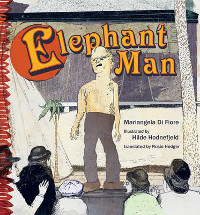Elephant man by Mariangela Di Fiore

Ill. by Hilde Hodnefjeld. Translated by Rosie Hedger. Allen and
Unwin, 2016. ISBN 9781760292201
(Age: 7+) Highly recommended. Prejudice, Isolation, Disfigurement,
Disease, Nineteenth century England. When I first saw this on the
Allen and Unwin website, I grabbed my iPad to check on the story of
this singular man, Joseph Merrick who died in 1890 so I was excited
to receive the book for review. But nothing prepared me for this
tale of isolation, of rejection, of disfigurement and finally of
friendship. The bare facts on Wikipedia are embellished in this
beautiful retelling, the author, Mariangela Di Fiore, telling us
that she used the facts but added what she felt would have been
Joseph's voice. She has successfully drawn an image of a man bereft
of friends, abused, ignored, derided because of his deformities, but
in her words, translated most effectively by Rosie Hedger, given a
presence that cannot be ignored by the reader.
Born in 1863, his deformed body took some time to develop. His
loving mother died when he was eleven, and his father remarried a
woman who despised him. Forced to find work, he had problems as his
ability to use his hands decreased, and eventually he was taken up
by a character who ran a freak show, which toured the countryside
exhibiting others with deformities: a bearded woman, a very thin
man, a fat lady and so on. Nobody spoke to Joseph and daily his life
became more secluded. He met a doctor who worked at the London
Hospital, and he gave him his card. Later when Joseph was abandoned
in Europe, the police found the card and contacted the doctor who
took him in. He lived the rest of his life in the London hospital in
his own rooms, a curiosity but treated with care and attention by
the doctor and other visitors.
The beautiful writing develops an empathy between the plight of this
young man and the reader, and the whole is consistently ablaze with
incredible photographs, sepia images of Joseph, tickets and writings
forming a strong feeling for nineteenth century England. This book
will impel readers to rethink their attitudes to those they see and
meet who look different, and leave behind a lasting impression of
one man's story and his final acceptance.
Fran Knight